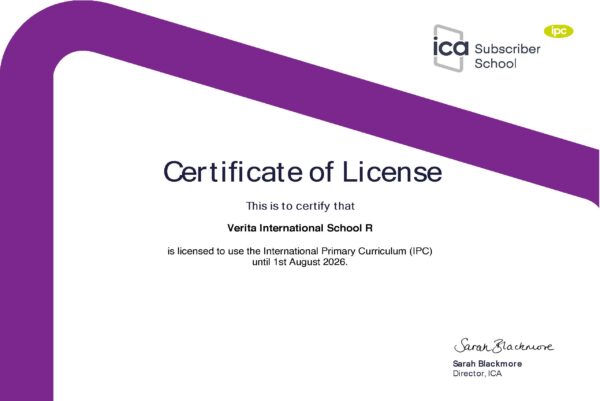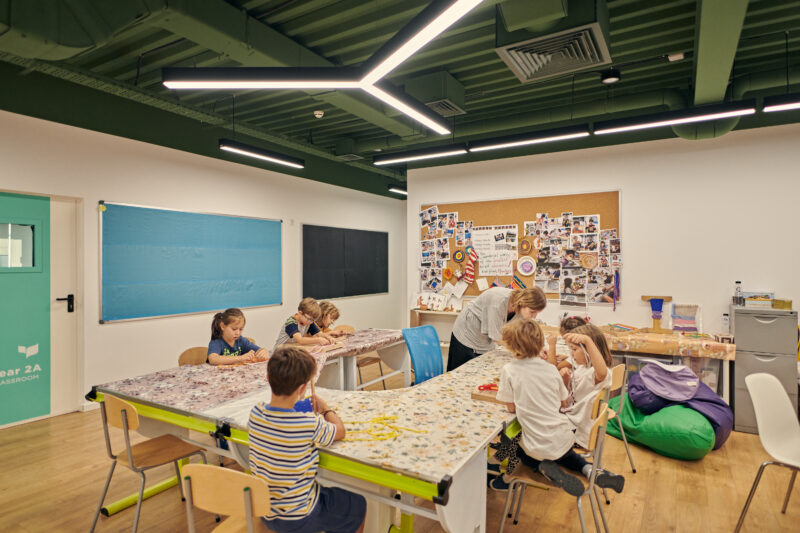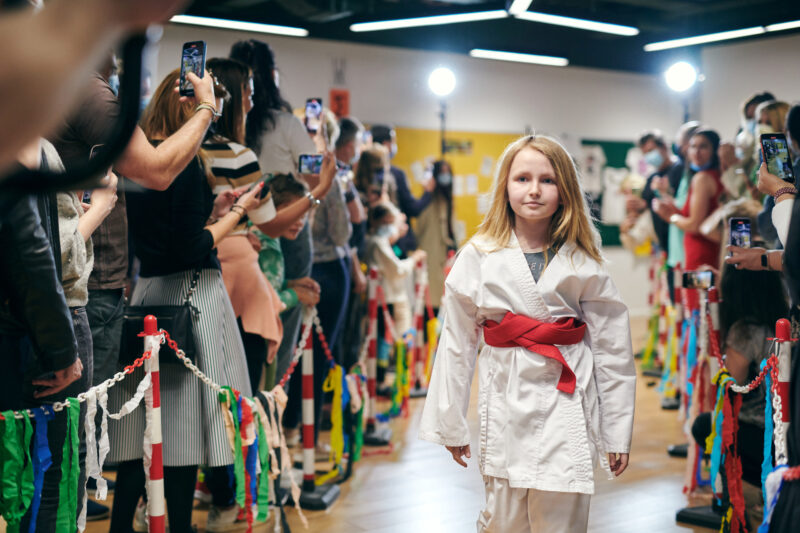Primary School
Overview
Verita International School proudly offers the National Curriculum of England and Wales. With a focus on inquiry and experiential learning, students are encouraged to explore the world around them and to learn by doing. Classroom spaces and learning experiences are carefully structured by our teachers, learning assistants, and administrators, facilitating an interdisciplinary approach to learning that allows students to apply knowledge and skills from a variety of academic areas.
We are dedicated to the balanced development of all children in the Primary School, with a belief that in addition to fostering strong academic achievement, we must also provide strong opportunities for positive social and emotional development. We strive daily to offer an active, engaging and stimulating learning environment for all students in order to help them become successful, productive, and positive members of their local and global communities.
Introduction Letter
Tim Springham, Head of Primary and Early Years
Dear Parents and prospective families of Verita International School,
Welcome to our wonderful learning community where students from all around the world learn in collaboration and with mutual respect of each other’s culture, language and school experience.


Introduction Letter
Tim Springham, Head of Primary and Early Years
Dear Parents and prospective families of Verita International School,
Welcome to our wonderful learning community where students from all around the world learn in collaboration and with mutual respect of each other’s culture, language and school experience.
International Primary Curriculum (IPC)
The International Primary Curriculum (IPC) is used in schools all over the world. This includes nearly 1,800 national and international schools in over 90 countries.
Learning with the International Primary Curriculum means that children focus on a combination of academic, personal and international learning that is exciting and challenging. The aim of the IPC is to help every child enjoy the learning of a wide range of subjects and to develop an inquiring mind, the personal attributes that will help throughout teenage and adult years, and to develop a sense of his or her own nationality and culture, at the same time developing a profound respect for the nationalities and cultures of others. Through the IPC approach to learning children develop the knowledge, skills and understanding necessary to confidently face the world of tomorrow.
For more information about the IPC visit their website.
Here is our programme of inquiry that outlines all of our IPC units in the Primary School.
| UNIT 1 | UNIT 2 | UNIT 3 | UNIT 4 | UNIT 5 | UNIT 6 | |
| Y6 | Theme: Plants Unit: Roots, Shoots & Fruits | Theme: Humans & Other Animals Unit: Being Human | Theme: Migration Unit: Moving People | Theme: Global Warming and Sustainability & Explore Globalisation Unit: Climate Control & Earth as an Island | Theme: Living in Space Unit: Mission to Mars | Theme: Myths, Legends & Beliefs Unit: Myths & Legends |
| Y5 | Theme: The art of learning Unit: Brainwaves | Theme: Rivers Unit: Go with the Flow | Theme: Earth & Space Unit: Space Scientists | Theme: History of Non-European Societies Unit: AD 900 | Theme: Evolution & Inheritance Unit: Out of Africa | Theme: Scientific Inquiry: Materials & Their Properties Unit: Investigators |
| Y4 | Theme: Human Body Unit: How Humans Work | Theme: Food Unit: Chocolate | Theme: Popular Culture Unit: Fashion | Theme: Significant People Unit: They Made a Difference | Theme: Electricity Unit: Bright Sparks | Theme: Our Earth Unit: Active Planet |
| Y3 | Theme: The Art of Learning Unit: Brainwaves Theme: Community Unit: Living Together | Theme: Archaeology & Ancient Civilizations Unit: Treasure & Temples, Tombs and Treasure | Theme: How Things Work Unit: Inventions that Changed the World | Theme: ICT and Computing Unit: Digital Gamers | Theme: Habitats Unit: Land Sea and Sky and Let’s plant it | |
| Y2 | Theme: Human Body Unit: Super Humans | Theme: Celebrations Unit: Let’s Celebrate! | Theme: Things people do Unit: A Day in the Life | Theme: The Environment Unit: Our World | Theme: Sound and Light Unit: Look and listen | Theme: Grouping and Classifying Materials Unit: What’s it Made Of |
| Y1 | Theme: Art of learning Unit: Brainwaves | Theme: Toys and Games Unit: The Magic Toymaker | Theme: Explore the Globe Unit :Treasure Island | Theme: Clothes Unit: All Dressed up | Theme: Changing and Separating Materials Unit: Freeze it! | Theme: Electricity Unit: It’s Shocking! |

English
Literacy and Phonics
Literacy includes reading, writing, and the creative and analytical acts involved in producing and comprehending texts. Reading and writing are important to ensure success in school, on the job, and in society. Today’s expectations, however, encompass more than the ability to read, write, speak, and listen. These expectations include use of oral and written language to make sense of the world and to communicate, problem solve, and participate in decision-making. The foundation for these literacy skills is language and an understanding of how language works.
Pre-reading skills like phonics and phonemic awareness are taught through the Department of Education and Skills primary national strategy called ‘Letters and Sounds.’

Maths
The School follows the White Rose Education schemes of work. Taking objectives directly from the National Curriculum, the White Rose Education Hub have created an effective scheme of work which allows pupils of all groups to make progress through a variety of fluency, reasoning and problem solving questions. At Verita, we encourage the use of concrete objects to aid pupil understanding and incorporate them into our teaching whenever possible. The White Rose Education Hub provides term by term overviews for the National Curriculum with the aim of supporting primary schools, and teachers. At Verita, we want to help children to see the links between maths and other subjects and deepen their understanding through investigations and applications of maths across the curriculum.
Please click here to find out more about White Rose.

Inquiry-Based
Learning
At the primary level it is essential for us to use inquiry-based learning. Students showcase their understanding through various explorative projects and assignments.The emphasis is on independent learning and learning through mistakes. It is a shift from the conventional model of viewing students as empty vessels waiting to be filled with the teacher’s information. This allows students to take greater ownership and responsibility for their own learning.

Project-Based
Learning
Project Based Learning is a teaching method in which students gain knowledge and skills by working for an extended period of time to investigate and respond to an authentic, engaging, and complex question, problem, or challenge. This learning approach is something we use frequently at VIS as part of our IPC curriculum.

The School Day
The foundation for the learning environment originates from the way teaching is organised. We organize our day around core time, and specialist classes.
Core time is used for Maths, Humanities, Science, and English. At Verita, we advocate for using longer time blocks, believing that this provides the opportunity for flexibility and immersion. This ‘core time’ can be used to create longer blocks and can be sub-divided as needed by the teachers running the session. As a school that specialises in project-based learning (PBL), subjects such as English, Humanities or Science and Maths are combined and taught through projects in blocks. Students have time to get into the details of a project where they are encouraged to direct their own work and are taught how to give peer to peer support. This frees up the teachers to guide and instruct individual or small groups of students exactly when they need it. As a school who wants to implement a new way of learning, we had to rethink our daily structure, not simply change what is happening during each 40 minute period.
| Example Class | Monday | Tuesday | Wednesday | Thursday | Friday | ||
| 9am – 10:00 | 1h | Class / Meeting | Core | Core | Core | Core | Core |
| 10:00 – 10:50 | 50m | Class | Core | Core | Core | Core | Core |
| 10:50 – 11:10 | 20m | Break | |||||
| 11:10 – 12:00 | 50m | Class | Core | Core | PE | ICT | Art |
| 12:00 – 13:00 | 1h | Lunch | Lunch/ Break | Lunch/ Break | Lunch/ Break | Lunch/ Break | Lunch/ Break |
| 13:00 – 13:45 | 45m | Class | Music | Romanian | Core | Romanian | Core |
| 13:45 – 14:30 | 45m | Class | Core | SEL | Core | Core | Core |
| 14:30 -14:45 | 15m | Break | |||||
| 14:45 -15:30 | 45m | Class | Core | PE | Art | Core | SEL |
Ready to send your child on
the learning adventure of a lifetime?
We develop your child’s talents, build meaningful relationships in a safe environment, and make learning enjoyable. If you’re seeking an international, English-speaking school that encourages independence, creativity, and prepares children to thrive in a global world, Verita School is the perfect choice for your family.


